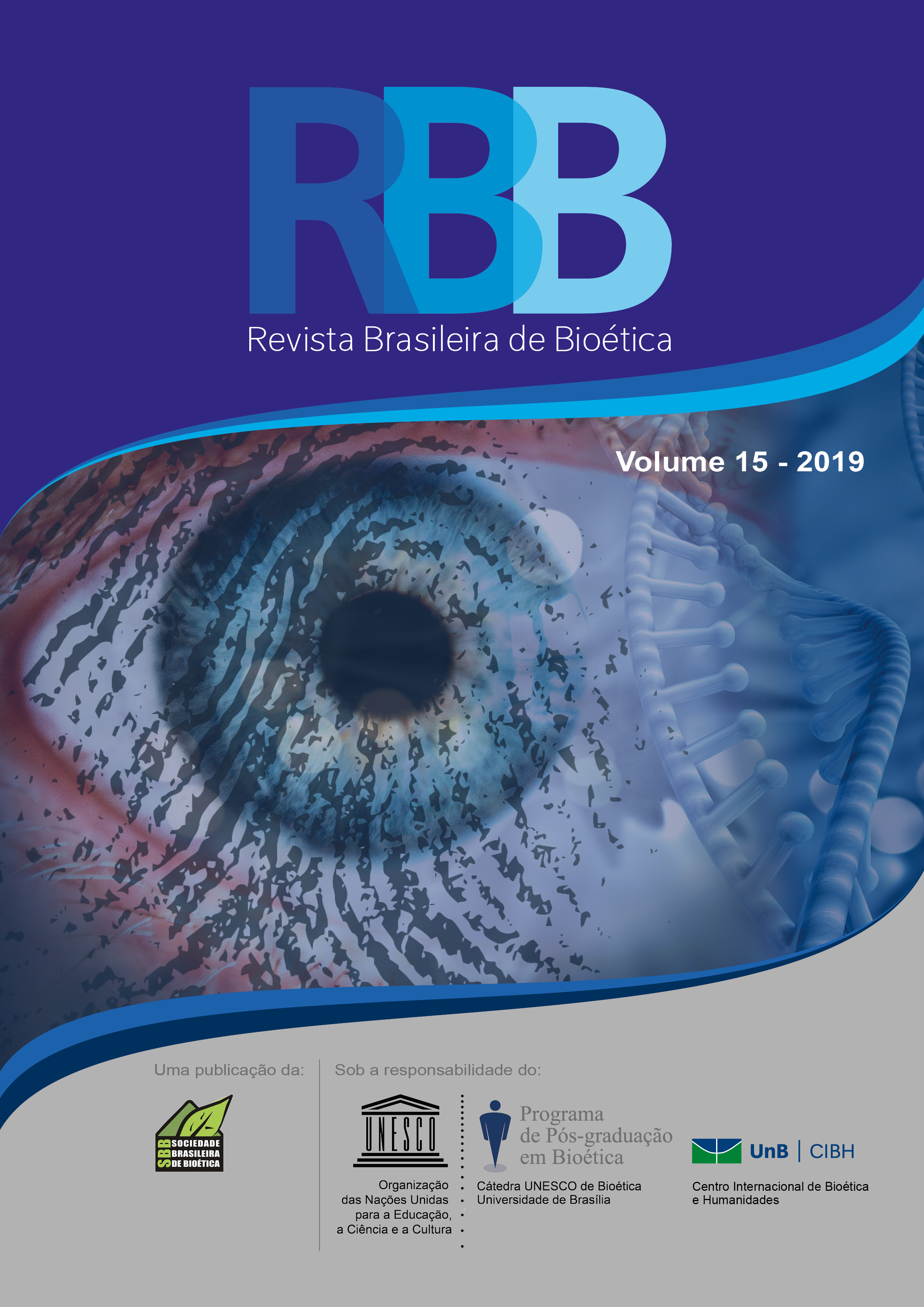Refusal of procedures in Rehabilitation Hospital: bioethics analysis.
DOI:
https://doi.org/10.26512/rbb.v15i1.26668Keywords:
Refusal. Bioethics. Nurse care. Rehabilitation.Abstract
It is important to analyses tensions in procedures during hospitalization of patients in a Rehabilitation Hospital. The aim of this study was to describe the refusal of the procedures in a Rehabilitation Hospital and to analyze it in the light of bioethics. Self-administered questionnaires were applied to nurses to identify the profile, the reason for the refusal of procedures and the impact on treatment. Of 190 admissions in a month, 20 declined procedures in wards. 55% were female, 61 years old, 75% through high school, 75% had comorbidities, 65% with surgical indication, length of stay 27.5 days, 10% refused procedures, including procedures of movement and nursing, consensus was reached by 50% with and consequences on attendance by 55%. Health professionals in general are aware that it is not possible care without the patient’s consent; however, this can have an impact to the patient. It is important that the patient understands the information that has been given to him and the repercussions of his decisions on his care and treatment, especially in rehabilitation, that require longterm or permanent care, depending on the degree of physical and psychological dependence.
Downloads
References
ARN. Association of Rehabilitation Nurses. Competency Model for Professional Rehabilitation Nursing. Disponível em http://www.rehabnurse.org/uploads/
files/education/ARN_Rehabilitation_Nursing_Competency_Model_FINAL_-_May_2014.pdf.
Bacote JC. A model of practice to address Cultural Competence in Rehabilitation Nursing Rehabilitation Nursing 2001; 26 (1): 8-11
Beauchamp TL, Childress JF. Principios de ética biomédica. São Paulo: Loyola; 2002.p.45.
COFEN. Conselho Federal de Enfermagem. Resolução nº 564/2017. Aprova o novo Código de Ética dos Profissionais de Enfermagem. COFEN. Brasília 2017.
Coulter Angela, Paternalism or partnership? Patients have grown up-and there’s no going back. BMJ. 1999 Sep 18; 319(7212): 719-720.
Gracia D. La bioética médica. In: Organización Panamericana de la Salud. Bioética: temas y perspectivas. Washington: OPAS 1990: 3-7.
Hughes DB, Ullery BW, Barie PS. The contemporary approach to the care of Jehovah’s witnesses. J Trauma 2008; 65(1): 237-47.
Mallia P. Are clarifications on feeding and hydration in PVS needed by Catholic authorities? Med Health Care Philos 2013; 16(4): 795-806.
Mitello L.When the patient asks for counselling, when the patient doesn’t ask for counselling, when the patient refuses therapy. Prof Inferm 2004; 57(4): 216-21.
Oliveira VL, Pimentel D, Vieira MJ. O uso do termo de consentimento livre e esclarecido na prática médica. Revista Bioética 2010; 18(3): 705- 24.
Pellegrino ED. La relación entre la autonomia y la integridad en la ética médica. In: Organización Panamericana de la Salud. Bioética: temas y perspectivas. Washington: OPAS 1990: 8-17.
Pollock K, Wilson E. Care and communication between health professionals and patients affected by severe or chronic illness in community care settings: a qualitative
study of care at the end of life. Health Serv Delivery Res 2015;3:31.
Redley M, Keeley H, Clare I, Hinds D, Luke L, Holland A. Respecting patient autonomy: understanding the impact on NHS hospital in-patients of legislation and guidance relating to patient capacity and consent. J Health Serv Res Policy 2011;16(1):13-20.
Tomkowiak JM. How Do We Ethically Manage Patients Who Refuse Therapy? Rehabilitation Nursing 2004; 29 (3): 77-89.
Nunes R. Consentimento informado e boa prática clínica, Revista Julgar NE; 2014: 115-137 (2014B).
Wanssa MCD. Autonomia versus beneficencia. Rev. bioét (Impr.) 2011; 19(1): 105- 17.
White MJ. A Pilot for Understanding Interdisciplinary Teams in Rehabilitation Practice Rehabilitation Nursing 2013; 38: 142-152.
Downloads
Published
How to Cite
Issue
Section
License
Copyright (c) 2019 Revista Brasileira de Bioética

This work is licensed under a Creative Commons Attribution-NonCommercial-ShareAlike 4.0 International License.



